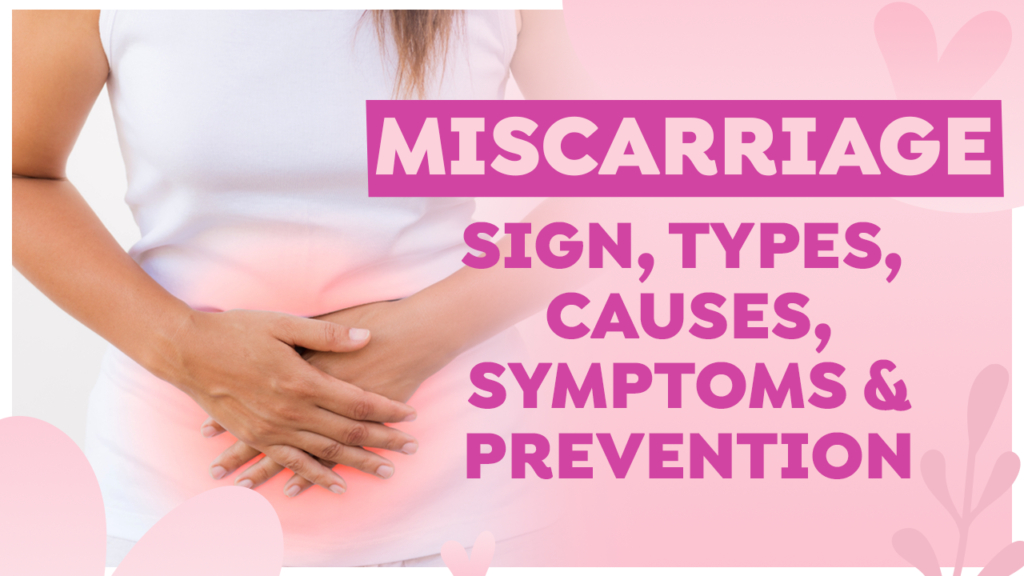Miscarriage (also known as early pregnancy loss) is when a baby died in the womb (uterus) before the 20th week of pregnancy.

Miscarriage (also known as early pregnancy loss) is when a baby died in the womb (uterus) before the 20th week of pregnancy. About 10 to 20 percent of known pregnancies end in miscarriage. But the actual number is likely higher because many women have a miscarriage even before they know they are pregnant. Most miscarriages happen in first trimester i.e: before 12th week of pregnancy. Miscarriage in second trimester (between 13 and 19 weeks) happens in 1 to 5 percent pregnancies. Although it is very common, but it can be a very traumatic experience for a women. Most women who miscarry go on to have a healthy pregnancy later. After one miscarriage, the predicted risk of miscarriage in a future pregnancy is usually about 20%. After two consecutive miscarriages, the risk of another miscarriage increases to about 28% and after three consecutive miscarriages, it increases to about 43%
TYPES
1. THREATENED MISCARRIAGE:
A woman may experience light vaginal bleeding or lower abdominal pain that can last up to several days or weeks.
- Cervix is still closed but the pregnancy loss has not yet occured.
2. INEVITABLE MISCARRIAGE:
- In this type of miscarriage, there is a lot more vaginal bleeding and strong lower stomach cramps.
- Cervix opens and the developing fetus will come away in the bleeding.
3.COMPLETE MISCARRIAGE:
- It occurs when all the pregnancy tissues are expelled from the uterus which is accompanied by vaginal bleeding continuing for several days.
4.INCOMPLETE MISCARRIAGE:
- Where some pregnancy tissue left your uterus while some tissue remains in the uterus.
5.MISSED MISCARRIAGE:
- Sometimes, the embryo dies but the body does not expel the pregnancy tissue and it stays in the uterus.
- Symptoms like bleeding or pain are not experienced
6.RECURRENT MISCARRIAGE:
- Is the occurrence of a miscarriage 3 or more times in a row
7.SEPTIC MISCARRIAGE:
- Where the tissue from a missed or incomplete miscarriage causes infection in the uterus.
8.ECTOPIC PREGNANCY:
- Where the baby develops outside the uterus in one of the fallopian tubes.
9.BLIGHTED OVUM MISCARRIAGE:
- Where the embryo doesn’t develop but the gestational sac continues to grow.
CAUSES
Miscarriage can happen for various reasons like;
- 1. Abnormal placenta development which hinders the blood flow from mother to the baby
- 2. Chromosomal abnormalities in the baby, about 50% of miscarriages are associated with extra or missing chromosomes.
- 3. Abnormal shape of womb
- 4. Weakened cervix or uterus
- 5. Malnutrition or poor dietary conditions
- 6. Certain medications
Underlying health conditions including;
- pre existing diabetes
- high blood pressure
- autoimmune disorder such as Lupus
- hormonal problems like polycystic ovary syndrome (PCOS)
- kidney diseases
- thyroid problems
RISK FACTORS FOR MISCARRIAGES:
- Obesity
- old maternal age i.e: being 35 or older
- two or more previous miscarriages
- being underweight
- Smoking
- alcohol abuse
- harmful drugs
SYMPTOMS:
- Vaginal spotting or bleeding
- Lower abdominal pain or cramping
- Lower back pain
- Vaginal discharge that looks whitish in colour and mucousy
- Decreased pregnancy symptoms such as tender breasts and morning sickness
- Weight loss
DIAGNOSIS:
Following tests are performed for diagnosis:
Pelvic exam: To assess the cervix for dilation/opening
Ultrasound: Your health care provider will check for a fetal heartbeat and determine if the embryo is developing as it should be.
Transvaginal ultrasound: Where a probe is inserted in your vagina to check for the fetal heartbeat, which is performed in case of blood loss, pain or both
Blood tests: To check the levels of pregnancy hormones, Human Chorionic Gonadotropin (HCG)
PREVENTION:
Althought most miscarriages cannot be prevented, taking precautions can increase the chances of a healthy pregnancy and lower the risk of miscarriages, these include;
- Follow healthy lifestyle by avoiding smoking, illicit drug use and alcohol consumption
- Limit your caffeine intake to 300mg or less per day
- Exercise daily to maintain a healthy weight
- Eating a balanced and healthy diet including calcium, iron and folate
- Immunization against infections during pregnancy such as rubella
